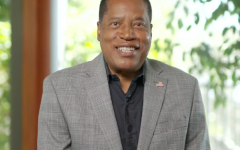
Venice, Los Angeles (Photo: Evan Symon for California Globe)
Commentary: Unreliable Narrators, The Media
Unreliable narration includes the narrator contradicting himself, having gaps in memory, or lying to other characters– all commonalities found in the media today
By Soledad Ursúa, September 28, 2021 6:39 am
Recently I have come under fire from many of my liberal friends for my support of Larry Elder, an African American Gubernatorial Candidate who ran to replace Gavin Newsom in California’s recent Recall election. Why were they so upset? You know, because he is “racist.” They all pointed to the Los Angeles Times or other media articles about Elder’s “support for reparations for slave owners” and “wants the minimum wage to be $0 per hour,” all claims and statements that were taken out of context and easily disproved as not true. But at the end of the day, if the woke LA Times editorial board and writers warn its readers that Larry Elder is the “Black Face of White Supremacy”, well then it must be true.
When one friend told me that Larry Elder believes that slave owners are owed reparations, it didn’t sound logical. So I decided to research it for myself. One article referenced a July 18 episode of Prager University’s “The Candace Owens Show” in which it quoted Larry Elder saying argument could be made that slave owners were owed reparations after the Civil War because slavery was legal and their “property” had been taken. Instead of simply relying on the article to summarize what was said during the podcast, I listened to the actual recording for myself. It was true: he did say that, but what the article failed to mention was that this was one of the reasons Elder was against reparations since it was a complicated issue due to the fact that slaves were considered private property back then.
The extra 5 minutes of conducting due diligence on my own easily disproved this false statement that was perpetuated by the media on a mass scale and accepted by its readership including many of my friends.
For as long as I can remember, every time I sit down to read something, I first ask myself a few framing questions: Who is writing this? What is their agenda? Can I trust them? Where did this come from? I wondered how my friends could be so naive to simply accept everything that they are told and take every statement by the media for face value? But it also made me wonder why I question everything that I am told. Admittedly, my parents grew up during the “Question Authority” beatnik generation, a philosophy they embraced even as they each assumed authoritative societal roles.
And then it hit me! It was in high school AP English when we were assigned The Adventures of Huckleberry Finn, one of the Great American Novels written by American author Mark Twain. Famous for its colorful description of people and places along the Mississippi River, Twain employs a moralistic tone on the theme of slavery and racism, whereby Huck asks questions and confronts moral dilemmas that enable him to see the basic injustice of slavery over the course of the novel. Written in the first-person point of view, the novel allows the reader to experience the story through Huck’s eyes, serving as a literary function of an “unreliable narrator.”
In literature, an unreliable narrator is a character who tells a story with a lack of credibility and impaired sense of judgement.
The unreliable narrator trope is a common storytelling device in TV series and movies alike, yet it’s used for varying ends and purposes. Sometimes, the unreliable narrator reveals his or her status from the beginning; other times, these narrators don’t let on, leaving viewers to draw their own conclusions. Common signals of unreliable narration include the narrator contradicting himself, having gaps in memory, or lying to other characters– all commonalities found in the media today.
Ironically, woke progressive school boards, libraries, and others have banned the book for its use of the N-word and slavery depictions, ignoring (or never grasping?) the significance of the larger theme of the unreliable narrator. One might say that the media is in a constant state of contradiction. While the media is a champion of #MeToo movement, they all but gave a pass to allegations made by the esteemed Rose McGowan that the First Lady of California had sought to buy her silence when she blew the whistle against Harvey Weinstein.
The mainstream media certainly has selective memory gaps when it comes to protecting their own. During the California recall election, the media quickly joined to protect the Democratic Governor, and in the process of their spirited defense, somehow forgot that Newsom had lost $11 billion in fraudulent Unemployment Fund dollars, that he squandered $1 billion purchasing N95 masks from a Chinese Company that turned out to be fake, that his wife was collecting a $250k+ annual salary paid for by PG&E–the very company held liable for many of CA’s wildfires, and everyone seemed to all but forget the notorious $100 billion bullet train to nowhere–which is $20 billion more than the price tag of a year ago.
Does the media lie to others? It certainly seems to grossly misrepresent the truth and produce bombshell hit pieces when needed. The LA Times downplayed a racially charged attack on Elder with a misleading photo they published that implied he was the suspect in an assault matter, when he had actually been the victim of a hate crime. The Times let this photo stand for over 20 hours once it was immediately challenged. When they finally did make the change, they did so without printing a notice of correction or apology.
With all this, why would we treat the media as anything other than the Unreliable Narrator that it is.
It was Descartes who first taught us the term, “I doubt, therefore I think, therefore I am”– A philosophical proof of existence based on the act of doubting one’s own existence served—at minimum—as proof of the reality of one’s own mind and existence (and, sadly, that concept has been edited to exclude the act of doubting). Perhaps a modern argument could be made that when we cease to doubt the media and ponder the reliability of their narration, we cease to think; therefore we cease to exist.
- Commentary: Unreliable Narrators, The Media - September 28, 2021





Great points, Soledad! I keep telling my friends to do their homework before they back a stupid headline. How Newsome managed to keep his job just boggles the mind.
Not really boggle the mind when one considers that the 12 cents/ gallon gas tax was passed on the basis of a spurious ballit argument in favor of its passing. Delayed response time for emergency services is preposterous when emergency vehicles can travel unimpeded through 8ntersections and every other vehicle on the roadway being used by the emetgency vehicle must by law yield to them.